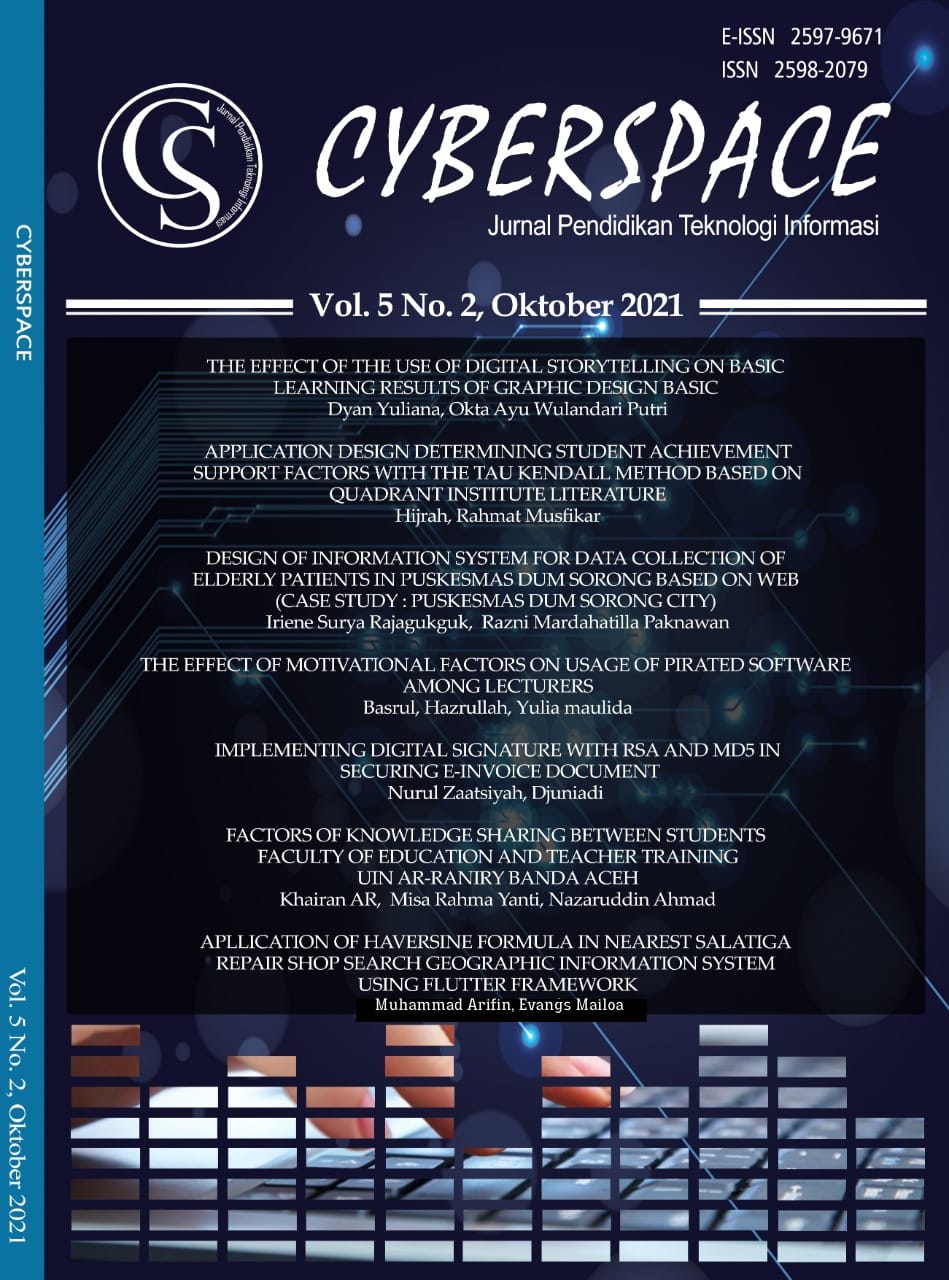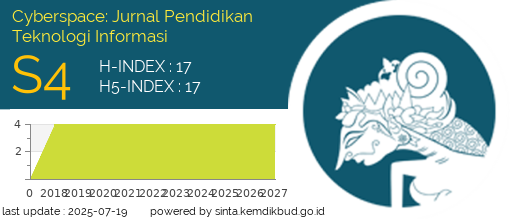THE EFFECT OF MOTIVATIONAL FACTORS ON USAGE OF PIRATED SOFTWARE AMONG LECTURERS
DOI:
https://doi.org/10.22373/cj.v5i2.9527Keywords:
motivation, pirated software, lecturersAbstract
This study aims to determine the influence of motivational factors in using pirate software among lecturers in one of the faculty of education and teacher training in Aceh. The research method that was applied in this study is a quantitative method and it uses simple random sampling for collecting data. It was obtained by distributing the instrument to lecturers with the number of samples determined using the Slovin formula is 68 respondents. After passing the validity and reliability testing phase, data is analyzed by using Pearson Product Moment Correlation. The result explained that there was a significant influence between motivational factors and using pirated software. The final result of the correlation test for two variables with a coefficient value of 0.876 and a significant level of 0.000 with a very good level of relationship category.
References
Basrul and H. Ahmadian, “Overview Of Pirated Software On Campus: Educators’ Perspective,” Cybersp. J. Pendidik. Teknol. Inf., vol. 4, no. 2, pp. 118–128, 2020.
B. A. Majid, S. Vivianie, and B. Yusuf, “Studi Evaluasi Penggunaan Software Bajakan Di Kalangan Mahasiswa Ftk Uin Ar-Raniry,” Cybersp. J. Pendidik. Teknol. Inf., vol. 2, pp. 37–47, 2018.
A. Mishra, I. Akman, and A. Yazici, “Software piracy among IT professionals in organizations,” Int. J. Inf. Manage., vol. 26, pp. 401–413, 2006.
Z. TAFER and M. ABBAR, “Software Piracy in Developing Countries: Prevalence, Causes and Some Propositions,” Glob. J. Econ. Bus., vol. 3, no. 2, pp. 199–224, 2017.
Z. Liao, S. Nazir, A. Hussain, H. U. Khan, and M. Shafiq, “Software Piracy Awareness, Policy, and User Perspective in Educational Institutions,” Hindawi Sci. Program., 2020.
A.-M. Suduc, M. Bizoi, and F. G. Filip, “Ethical Aspects on Software Piracy and Information and Communication Technologies Misuse,” in IFAC Proceedings Volumes, 2009, pp. 30–35.
A. Haque, “Exploring Critical Factors Choice of Piracy Products: An Empirical Investigation on Malaysian Customers’,” Eur. J. Econ. Financ. Adm. Sci., no. 30, pp. 84–94, 2011.
A. Mardalis and P. S. Dharma, “Faktor-Faktor Yang Mempengaruhi Penggunaan Software Bajakan Di Kalangan Mahasiswa,” BENEFIT J. Manaj. dan Bisnis, vol. 16, no. 2, pp. 99–105, 2012.
Q. T. Pham, N. M. Dang, and D. T. Nguyen, “Factors Affecting on the Digital Piracy Behavior: An Empirical Study in Vietnam,” J. Theor. Appl. Electron. Commer. Res., vol. 15, no. 2, pp. 122–135, 2020.
A. P. Wicaksono and D. Urumsah, “Perilaku Pembajakan Produk Digital: Cerita Dari Mahasiswa di Yogyakarta,” J. Apl. BISNIS, vol. 17, no. 1, pp. 22–42, 2017.
I. G. A. K. Permana, R. A. Windari, D. G. Sudika, and Mangku, “Implementasi Undang-Undang Nomor 28 Tahun 2014 tentang Hak Cipta Terhadap Perlindungan Karya Cipta Program Komputer (Software) di Pertokoan RIMO Denpasar,” e-Journal Komunitas Yustitia Univ. Pendidik. Ganesha Jur. Ilmu Huk., vol. 1, no. 1, pp. 55–65, 2018.
X. Fang and S. Lee, “Comparative Empirical Analysis on Computer Software Piracy Behaviors between China and the United States:An Exploratory Study,” J. Int. Technol. InformationManagement, vol. 25, no. 2, pp. 47–66, 2016.
F. Wahid, “Motivasi Pembajakan Software: Perspektif Mahasiswa,” SNATi, pp. 49–54, 2004.
C. W. Yoo and M. Kim, “Factor motivating software piracy in Vietnam,” 2008.
Turkamun, “Perlindungan hukum dalam pelanggaran Hak Cipta Software ditinjau dari Undang-Undang Nomor 28 Tahun 2014 Tentang Hak Cipta,” J. Sekr., vol. 4, no. 2, 2017.
N. A. Rakhmawati, “SOFTWAREOPEN SOURCE, SOFTWAREGRATIS?,” JUTI, vol. 5, no. 1, pp. 13–18, 2006.
Downloads
Published
Issue
Section
License
Authors who publish with Cyberspace Journal agree to the following terms:
- Authors retain copyright and grant the journal right of first publication with the work simultaneously licensed under a Creative Commons Attribution License that allows others to share the work with an acknowledgement of the work's authorship and initial publication in this journal.
- Authors are able to enter into separate, additional contractual arrangements for the non-exclusive distribution of the journal's published version of the work (e.g., post it to an institutional repository or publish it in a book), with an acknowledgement of its initial publication in this journal.
- Authors are permitted and encouraged to post their work online (e.g., in institutional repositories or on their website) prior to and during the submission process, as it can lead to productive exchanges, as well as earlier and greater citation of published work (See The Effect of Open Access).



















